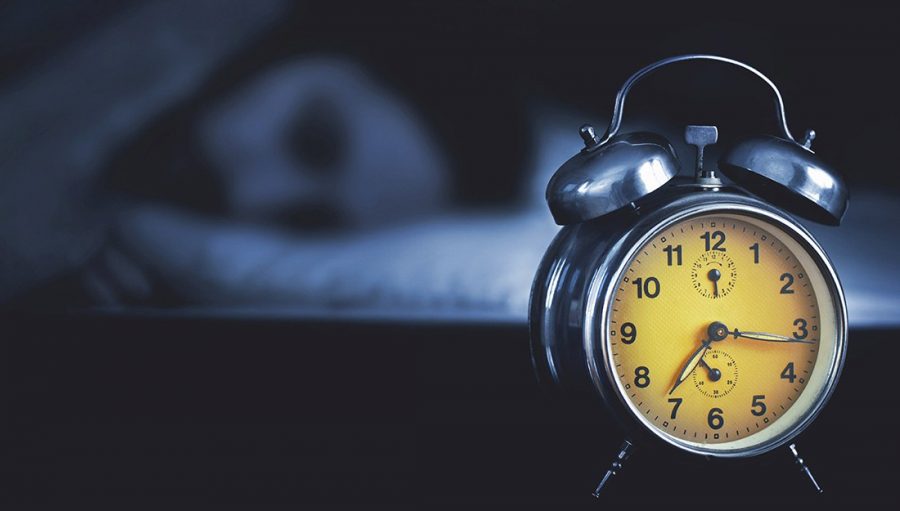The clock ticks more and more, increasing its numbers with each passing second. As the clock reaches 2:00 AM, freshman Langston Burns throws back his covers and sits up. He has no need to rub his eyes awake, for he has not felt sleepy all night. Burns heads to his desk and spends the next sleepless hour finishing the homework he had procrastinated on.
When the clock reaches 3:00 AM, Burns locates his sleeping pills. Having experienced these nights for the past two months, he knows staying up all night would not be beneficial for a taxing day of school at OTHS. Burns throws back a pill and heads to bed; the hormone-inducing soon takes Burns into a slumber. He needs to get as much shuteye as he can, mostly because the fridge is devoid of his daily sugary drinks.
“I don’t really know how, but I have insomnia,” Burns says.
With 60 million people, including Burns, under its effects, insomnia is the world’s most common sleep disorder. These effects vary with the type of insomnia one has. The severity of effects can be altered by the duration of endurance for a specific person.
“It’s probably been like a year,” Burns said.
Though he was diagnosed only two months ago, Burns believes he has experienced his lack of sleep for almost a year. The biggest effects of mild insomnia are fatigue, or weariness from exertion. In the case of insomnia, even day-to-day activities can cause immense bodily fatigue.
“I’m tired, but I get a lot done,” Burns says.
Most people who experience insomnia are like Burns; these people have mild insomnia. According to internist Dheepa Kamal, insomnia can be mild or chronic, and primary or secondary. Burns experiences primary mild insomnia, which 1 in 3 people in the world endure.
“Without proper sleep, stress disorders and diseases can happen,” says Kamal.
As stated by Kamal, these effects can include depression, anxiety and undue stress, hypertension, or high blood pressure, obesity, and increase in risk of heart attack. Lack of sleep can also lower one’s focus and reaction time, which can be trivial, by lowering focus level at work or school, or life-threatening, if the affected person takes to the road. Though these effects vary in degree depending on the type of insomnia one has, any variety of insomnia can lead to stress and disease, which can also cause or worsen a sleep disorder.
“The most important thing is to identify the cause,” says Kamal. “In my opinion, the leading cause of a sleep problems are unhealthy sleep habits.”
Identifying the cause is important for the course of treatment. If one’s cause of insomnia is unhealthy sleep habits, it can be treated through adjusting sleep pattern to follow a proper circadian rhythm, or sleep cycle. In situations like Burns’, where good sleep is necessary due to constant physical and mental use, pills can be ingested to increase sleep hormones that cause drowsiness.
“In cases where there is no cause found, good sleep hygiene helps,” Kamal says.
Proper sleep hygiene consists of having a regular routine for bed timing and limiting strain factors before sleep. These strain factors include going against our natural circadian rhythm, or sleep cycle, excess caffeine consumption, napping too much or too long, and using the bedroom as a place of work and stress, rather than relaxation. Another factor that affects sleep hygiene is travel; sudden exposure to different time zones leads to circadian dysrhythmia or desynchronosis, more commonly known as jet lag.
“I have had jet lag,” said Krithika Maki, another OTHS freshman and frequent traveler to India.
India operates on Indian Standard Time (IST), which is 11 hours and 30 minutes ahead of Central Standard Time (CST). This immense difference in time causes jet lag for travelers like Maki. The effects of this disruption to circadian rhythm cause the affected traveler effects similar to insomnia.
“When I travel to different time zones, it takes time for me to get back to my normal schedule,” says Maki.
During the days of adjustment, the most common effect is fatigue. Sudden disruption to one’s sleep cycle, especially one as drastic as a trip to India, can cause persistent tiredness and headaches. The effects of circadian dysrhythmia last until the body generates a new sleep cycle.
“I cope with this by trying to get sleep whenever I can,” says Maki. “The biggest issue is that I’m not as active; I’m mostly tired throughout the day.”
Whether it is long term or quickly dissipated, sleep disorders cause a variety of extensive effects on the body. Humans need to spend one-third of the day in a restful sleep. Failing to accomplish this sleep can lead to stress and decreased alertness, which can cause many problems on their own.
“We can call it a major issue,” says Kamal.










